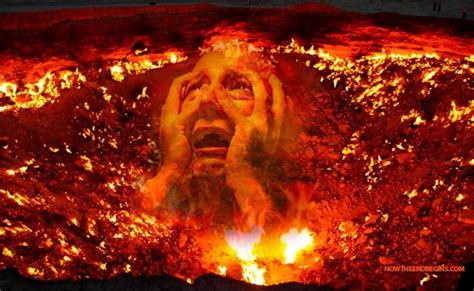
The major difference between positive law and heavenly law is that the former comprehensively covers man's relationship within his social system, while heavenly punishments remain the stuff of disputation: some see them as true laws, while others see them as mythical. If punishment is indeed a heavenly requirement then physical torture, burning alive with fire and all the horrors associated with that, along with the terrifying sensory flaying we learn about, place God in the guise of a terrorist.
POSITIVE LAW, on the other hand, eliminates the ingenious techniques for torturing men or denigrating his status on earth in the hope of reforming him restoring his position in the social system after serving his sentence. The scene of the horrors of the afterlife has been evoked, and its terror for the human soul demonstrated, in many Qur’anic suras and verses. The Surat al-Tawba, for instance, runs:
On the day when it shall be heated in the fire of hell, then their foreheads and their sides and their backs shall be branded with it; this is what you hoarded up for yourselves, therefore taste what you hoarded.[1]
And the surahs of the Qur’an grow more and more insistent on intimidating by physical torment, as in Surat Al-Haqqa:
Lay hold on him, then put a chain on him, Then cast him into the burning fire, Then thrust him into a chain the length of which is seventy cubits.[2]
There are perhaps many other otherworldly punishments that do not exist in man-made laws. For instance, we have Surat Al-Nisa:
Lo! Those who devour the wealth of orphans wrongfully, they do but swallow fire into their bellies, and they will be exposed to burning flame.[3]
While Surat Al Imran runs:
And let not those who hoard up that which Allah hath bestowed upon them of His bounty think that it is better for them. Nay, it is worse for them. That which they hoard will be their collar on the Day of Resurrection. [4]
Earthly laws do not include human failings of injustice and miserliness as constituents of their legislation and rulings, because ethics have nothing to do with criminal acts unless they are translated into actual criminality. A paragraph in Surat Al-Qalam asks “What? Shall we then treat those who submit [i.e. Muslims] the way we treat criminals?” [5] which shows the prioritisation of religious and ethical disposition over acts and evidence of crime. This does not lie within the remit of civil penal legislation. Similarly, a paragraph of Surat Al-Mu’minun which runs: “What! did you then think that We had created you in vain and that you shall not be returned to Us? “[6] evidences an emptying of the content of statutory penalties from their role because the fundamental point, according to the religious concept, is the punishment that takes place in the afterlife, since crime in this world is not equated to the punishment for it in the Hereafter.
How is eternal punishment valid after sinning is interrupted through death? This is the essence of the difference between the worldly reality and the Hereafter, for punishment in the afterlife is continuous and endless, which indicates the cruelty of God in applying his rulings. It makes the scale of divine justice all the more extreme and unjust as the punishment violates the balance between crime and its punishment. There is thus more justice in earthly reality. The commission of a worldly sin, even if it goes against his Lord, is something to be determined within a delimited time frame. Such sins are personal and do not affect the moral values of the world, whereas in the afterlife these sins are deemed eternal sins. Religious thought cannot give you an answer as to what benefit there is in perpetuating the punishment with all the sufferings and screams of the tortured. There is no point to God’s ruling these everlasting physical agonies and torturing billions in a fiery cauldron other than for Him to hear their screams of pain.
There is also the apparent contradiction whereby Satan is made to testify to divine justice, which goes against the religious idea of Satan and his lack of belief in it.
How could God invoke this testimony in proving the balance of His justice? How can the punishment of justice be justified by the testimony of those with whom God’s justice fundamentally disagreed? Surat Ibrahim provides an example of this contradiction in the concept of divine justice in the afterlife:
And the Shaitan shall say after the affair is decided: Surely Allah promised you the promise of truth, and I gave you promises, then failed to keep them to you, and I had no authority over you, except that I called you and you obeyed me, therefore do not blame me but blame yourselves.[7]
The punishment of the afterlife here is presented as demonstrating Satan’s testimony of God’s justice. The ‘everlasting fire’ contradicts this balance of divine mercy and impugns the very core attributes of the divinity as ‘the Gracious, the Most Merciful’. It makes the balance of divine justice collapse and empties it of any moral or humane value.
The procedure of man-made law is for it to be neither permanent nor constant, since it accepts addition and modification in adaptation to society’s needs. It is not dominated by the stamp of eternity or divine inexorability that allows its Texts to be stripped of values of social justice, or gives the perpetrator the opportunity to modify the method by which they may apply to mundane life. You may find the political origins of Sharī‘a in the very characteristics of Sharī‘a – in permanence and constancy, to which there can be no addendum or modification. They are thus hostage to the divine revelation, which cuts these Sharī‘a laws off from social development and even the most just of man-made legislation. That is why we find a wide gap between the theological mentality that cannot coexist with reality, and the justice procedures of positive laws.

Suggested Reading
The two parties, positivist and religious legislation, confront each other from two evidential and rational dugouts. The development of positivist criminal thought removed the brutal means that Islam legislated for in response to divine revelation. The positivist school brought about new modifications in the philosophy of punishment, and the Western world initiated a debate on legality of the death penalty as something that stands in contradiction to humane values, and the very purpose of mankind’s existence on earth. It denounced this punishment and abolished it from man-made legal constitutions, while this punishment remains central to countries that take religion as a source for implementing divine rulings that are far removed from modernity and development. These concepts of divine revelation have remained rooted in people’s beliefs and have not cracked in the face of liberal, leftist or secularist revolutions.
Social organization took as their starting point for law and the philosophy of punishment the conception that the individual was not granted life for there to be a right to deprive him of this life. Severe penalties that take away the life of the perpetrator represent a ‘revenge’ taken out on him. They must therefore be removed.
The progress of civilised life requires the international community, particularly countries with religious legislations, not to link the life of the offender with legislation on criminality, or its interpretations, in penal courts that adopt the Sharī‘a’s methodology of deterrence.
[1] Qur’an IX (al-Tawba), 35.
[2] Qur’an LXIX (Al-Haqqa), 30-32.
[3] Qur’an IV (al-Nisa), 10.
[4] Qur’an III (Al ‘Imran), 180.
[5] Qur’an LXVIII (Al-Qalam), 35
[6] Qur’an XXIII (Al-Mu’minun), 115.
[7] Qur’an XIV (Ibrahim), 22

